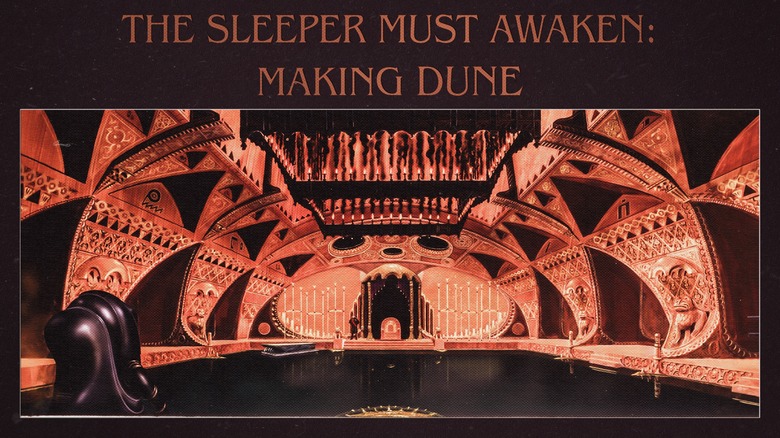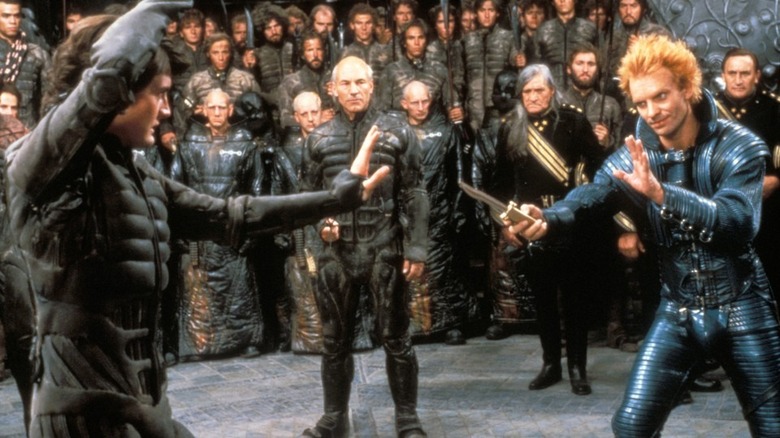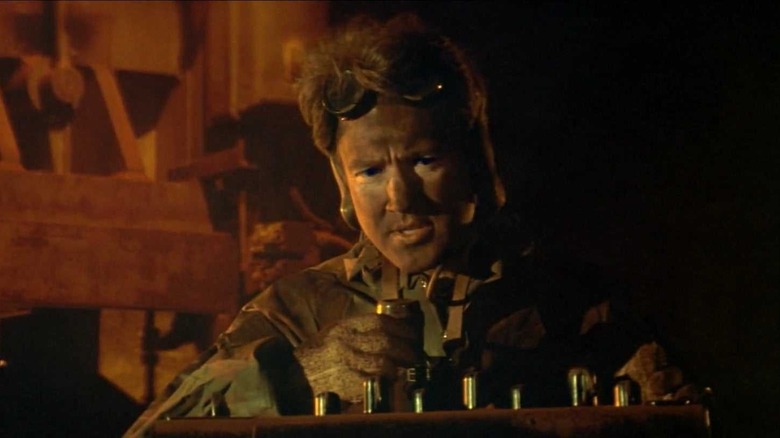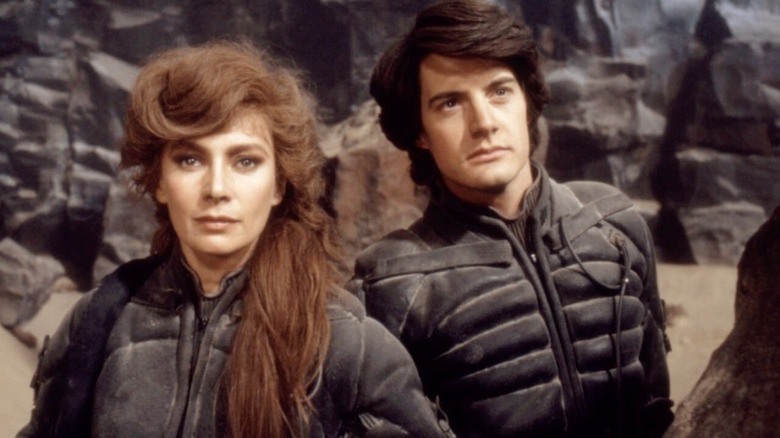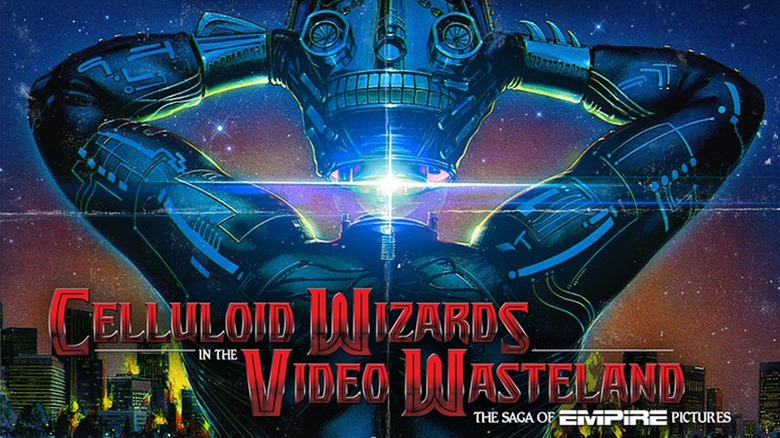The Sleeper Must Awaken Director Daniel Griffith On Arrow's Dune '84 Documentary [Interview]
Originally intended to be the primary special feature on last August's 4K release of 1984's "Dune" from Arrow Video (which features an incredible new transfer of the film), the feature-length documentary "The Sleeper Must Awaken: Making Dune" is finally available on the Arrow streaming service. The excellent doc dives deep into the sands of the David Lynch's infamous big budget sci-fi failure turned cult classic, containing dozens of new interviews along with archival excerpts with Lynch, Frank Herbert, and members of the cast and crew, which cover everything from script development to the shoot to post-production and the film's release to the poor box office and terrible reviews in December of 1984.
We got the chance to interview the doc's director Daniel Griffith, an award-winning filmmaker and the owner of Ballyhoo Motion Pictures, specializing in pop culture documentaries and original home media content. He has produced, directed, and edited over 150 documentary shorts and features for flicks like "Robocop," "Donnie Darko," "Escape From LA," "An American Werewolf in London," and "Streets of Fire." In 2018 he produced and directed the Saturn Award winning feature-length documentary about the making of "Waterworld" included in the fantastic Arrow Blu-ray set.
'I hoped that this approach would take the viewer back in time...'
Was the idea of not showing any of the talking heads due to Covid making it impossible to film people in person?
Yes. Mostly. I liked the idea of not seeing the interviewee's at the age they are now, but hearing their voices reminiscing about their own past experiences on the set of the film. I hoped that this approach would take the viewer back in time and allow them to hang around on the soundstage at Churubusco or on the rocky sand dunes of Sonora, Mexico. Jump cutting to a contemporary video clip of the "talking head" describing the memory would remind the audience that this is part of the past and that they, the viewer, were never there. Therefore, I instructed the interviewee's to refer to the past as the present and seldom drift into contemporary context, thus making all the interviews seem "archival." Obviously, I was improvising.
Of the talents you interviewed, who had the most surprising revelation about the production?
As a childhood fan of the film, I was as giddy as a schoolboy conducting every interview for this documentary. I usually keep my own opinion of the film being documented in check and just focus on telling an unbiased story. But it is hard to suppress those impulses when it is a dream project. Saying that, I really looked forward to interviewing concept artist Ron Miller because I knew he could help me establish the early foundations of the story. Remember, the work of a handful of artists in a room in Mexico City gave birth to the awe-inspiring (and in some cases, haunting) visuals that Lynch's "Dune" is still remembered for. If you don't emphasize their struggles and successes in the beginning, you lose the tragedy of the third act. You know, when everything gets left on the cutting room floor or marginalized into oblivion.
'Most of them are proud of their work.'
You used a lot of archive footage. Most of the behind the scenes that was shot for the film was destroyed by Universal. Was Paul Sammon's short convention film the main source?
Oh boy! Talk about the Holy Grail of all "behind the scenes" video footage. With every interview, I quietly hoped someone would add, "by the way, I have videocassette's of footage from the set." That being said, most of the visual materials I used to illustrate the story came from those I interviewed. To me, it was their story, and I did everything in my power to celebrate their achievements on the film. I did reference a lot of materials from the Universal vaults, including Paul's wonderful promotional reel. Paul Sammon was a great collaborator on this project. They all were, really. Every person I interviewed loved working on the film, or at the very least could see through the negatives and find the positives.
Getting people to go on the record can be difficult sometimes. Were there any talents you tried to get but ultimately could not that particularly bummed you out?
I wouldn't say "bummed" me out. I danced around with a few cast members for some time, but in the end, it didn't work out. Like I said earlier, most of the people involved with the making of the film recognized the monumental efforts being put forth to adapt the (then) unadaptable. Most of them are proud of their work. They should be!
'Villeneuve had a greater advantage than Lynch did...'
You utilized some footage from the extended television version in your film. What do you think of these scenes that did not make it into the picture?
I think the scenes and character arcs found in the extended version are the only window into what might have been if Lynch was allowed to continue with his vision for the film, whether it would've been two separate features or one longer epic. As they stand now, the scenes feel incomplete ... and for good reason. They are not meant to be there as a part of, or forced into, the original theatrical version. They are pieces of an entirely different animal.
How do you feel the 1984 version stacks up to the Denis Villeneuve one?
I think both versions succeeded with their own unique brand of world-building. I absolutely love both films for different reasons. I am thrilled that Villeneuve's film was so successful that he is allowed to move forward with the second part. But from the beginning, Villeneuve had a greater advantage than Lynch did during the making of the 1984 film. Lynch was a relative unknown in the industry going into "Dune." While "The Elephant Man" was a critical success, it was not "Arrival," "Sicario," or even "Blade Runner 2049." Plus, Dino De Laurentiis did not hire auteurs to make his films. He was the prevailing voice; the Emperor to Lynch's Duke. There's no doubt that Lynch had a great artistic vision for the material, but he did not have the track record that would give him final cut. That would have to be earned, and if it had been by the time "Dune" was made, I doubt Dino or his daughter Raffaella would've hired him.
On the upcoming Empire Pictures doc
What can you tell me about the current status of your Empire Pictures documentary?
The Empire Pictures documentary, entitled "Celluloid Wizards in the Video Wasteland," is in its final stages of completion. The pandemic transformed the feature-length documentary into more of a docs-series. It is now episodic and split into hour-long segments. Each episode reflects a year in the life of a struggling independent film company from the 1980's. I am still working with potential distributors worldwide and hope to make a deal to get it out later this year.
You've worked on many home video titles over the years. What would be your dream title to work on?
I have several, including an in-depth feature documentary about the making of Warren Beatty's "Dick Tracy" to the creation of the original "V" mini-series (which I have made attempts to do) to the struggles in making of the more recent "Cloud Atlas." So ... if anyone is reading and can help me bring those projects to life, please let me know.
"The Sleeper Must Awaken: Making Dune" is now available on the Arrow streaming service.
